












Another gaming bill is before this Hawaii State Legislature. This latest one called the Sports Gaming Bill aims to make sports betting (increasingly popular form of gambling) and poker (arguably the most popular card game) to be legally available on Oahu.
Clearly this bill is a test pilot for potentially expanding legal gambling in Hawaii. It was designed to evaluate what parts of gaming would be successful as a business and to what degree and types of gambling Hawaii residents would allow.
We know it’s a pilot because if approved it will only be available on Oahu. The Sports Gaming part, which would only take bets on-site, is a limited version testing the massive online sports gaming industry. The poker card feature is a limited exposure of card gambling but ultimately a test pilot for future card gambling to include other card games, then table games, and potentially a mini-full casino.
Make no mistake this bill by its design is a precursor to have multiple forms of gambling in the state. Hawaii residents shouldn’t be fooled by the low scale, limited to only two forms of gaming.
Hawaii residents should know what’s at stake (for better or worse). And what’s at stake – a small opening of the door to legal gambling is still an opening and could be difficult to close once that door is open.
It can be argued that these two types of gaming are not meant to attract the casual gambler, but those who are quite serious and passionate about gambling. We’re not talking bingo here. Or even lotto. Poker and sports betting have some of the most active and passionate gamers. The selection of these two types of gaming is very niche. Why these two types of gaming matters? Because we all know that those most prone to gambling addiction are not casual gamblers.
This bill is also carefully crafted not to be as aggressive as proposing a casino which has failed to get approval in the past, but not as subtle an introduction to gambling as per say bingo or a lottery.
There are some unfair and misleading arguments being made in support of this bill. First, one argument made is that passing this bill would cut down on the already illegal gaming businesses that exist. There’s no evidence of that happening in states with legal gambling. It’s more likely that the opposite occurs.
Supporters of the bill also do a lot of public relations about how additional streams of taxes from legalizing gaming would help support affordable housing, education and social services. There is mentioning of how some of these taxes would also go toward addiction programs and police enforcement to crack down on illegal gambling.
But what we’re not hearing much about are actual numbers and projections of how much the state would need to support in programs that would arise from all the negative effects of gambling. It could very well end up that there’s not enough in added tax collection from legalizing gambling that would be worth the money to support the social harms associated with gambling. It could be a net-zero game when all the factors are considered, and hard numbers are analyzed.
But perhaps the most misleading argument supporters of legal gambling in Hawaii is that the money from local Hawaii residents being poured into Las Vegas would be channeled to legal gaming in Hawaii.
This could be marginally true, but everyone knows the Las Vegas experience for Hawaii residents is not just about gambling,
Whether we like to admit it or not, the people of Hawaii love to gamble and it is one of our favorite pastimes. It’s common for friends and family to gamble socially at their private residence, which is legal in Hawaii (commercial gambling is illegal). Popular games are mahjong and poker. Most of the time, gambling are friendly wagers (bets among people we know). For serious, larger gambling, Hawaii residents will do that while on vacation where it is legal and run by professionals. That’s always how it worked.
The 2023 State Legislature just commenced this week. As it has been for decades, one of the attention-grabbing bills is related to making gambling in Hawaii legal in some form. We haven’t done a cover story on this for several years, so I decided to report on it and get the latest gambling push drawing controversy. Called the Sports Gaming Bill, it aims to make sports book betting and card room (but only poker) gambling legal in Hawaii. As of press time, the bill already passed first reading and is on its way to its next committee. In the cover story, I also interview some people in the Filipino community to get their opinion on the Sports Gaming Bill and whether commercial gambling should finally be legal in the 50th state.
Speaking of the Legislature and lawmaking, our community is saddened by the recent sudden passing of Ron Menor, a former Hawaii state senator and representative, and Honolulu City councilman. Menor, his legacy and life, is put together in a tribute editorial in this issue. We would like to extend our deepest condolences to the Menor family and convey to them how much we in the Filipino community are thankful for all the work he has done for our state and Honolulu.
Keeping on politics but on the national level, HFC columnist Emil Guillermo contributes “Jumpstarting the New Congress Hearkens Back to Ugly Immigration History.”
Also in this issue, the year is still fresh, so we wanted HFC contributor Renelaine Bontol Pfister to find out what some in our community are hoping for this 2023.
In Hawaii-Filipino news, community leader, Geminiano “Toy” Arre, Jr was selected to be honored by the University of the Philippines. UPAA-Hawaii invites the public to “Tribute to Manong Toy Arre” event on January 29, 5:30pm, Filipino Community Center in Waipahu. Be sure to see our calendar for other events and we encourage Filipino organizations, nonprofits and civic groups to submit their future events to be published in HFC.
We have other columns and news we hope you’ll enjoy. Thank you for supporting the Hawaii Filipino Chronicle. Until next issue, Aloha and Mabuhay!

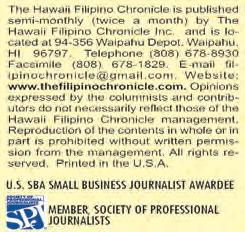
but about shows, entertainment, dining, shopping, traveling away and getting off the islands, as well as using Las Vegas as a starting point to visit California and other parts of the west in proximity of it. The gambling experience in Las Vegas also is about awe and being in a casino with an electric, vibrant atmosphere.
Hawaii residents will still be drawn to Vegas and anticipating that a large piece of that revenue pie spent by Hawaii locals there would go to legal gambling in Hawaii is assuming too much.
It’s hard to believe that the opportunity to travel to Las Vegas, to visit many of our families who live there and, in its proximity, as well as the opportunity to gamble in a place of luxury away from home (remember vacations are meant to experience
Publisher & Executive Editor
Charlie Y. Sonido, M.D.
Publisher & Managing Editor
Chona A. Montesines-Sonido
Associate Editors
Edwin QuinaboDennis Galolo
Contributing Editor
Belinda Aquino, Ph.D.

Design
Junggoi Peralta
Photography Tim Llena
Administrative Assistant Lilia Capalad
Editorial & Production Assistant Jim Bea Sampaga
Carlota Hufana Ader
Elpidio R. Estioko
Perry Diaz
Emil Guillermo
Melissa Martin, Ph.D.
Seneca Moraleda-Puguan
J.P. Orias
Pacita Saludes
Reuben S. Seguritan, Esq. Charlie Sonido, M.D.
Emmanuel S. Tipon, Esq.
Clement Bautista
Edna Bautista, Ed.D.
Teresita Bernales, Ed.D.
Sheryll Bonilla, Esq. Rose Churma
Serafin Colmenares Jr., Ph.D. Linda Dela Cruz
Carolyn Weygan-Hildebrand
Amelia Jacang, M.D.
Caroline Julian
Raymond Ll. Liongson, Ph.D. Federico Magdalena, Ph.D. Matthew Mettias
Maita Milallos
Paul Melvin Palalay, M.D.

Renelaine Bontol-Pfister Seneca Moraleda-Puguan
Mark Lester Ranchez
Jay Valdez, Psy.D.
Glenn Wakai
Amado Yoro
Philippine Correspondent: Greg Garcia
Neighbor Island Correspondents:
Big Island (Hilo and Kona)
Grace LarsonDitas Udani
Kauai
Millicent Wellington
Maui
Christine Sabado
Big Island Distributors
Grace LarsonDitas Udani
Kauai Distributors
Amylou Aguinaldo
Nestor Aguinaldo
Maui Distributors
Cecille PirosRey Piros
Molokai Distributor
Maria Watanabe
Oahu Distributors
Yoshimasa Kaneko
Pamela Gonsalves
Shalimar / Jonathan Pagulayan
Advertising / Marketing Director
Chona A. Montesines-Sonido
Account Executives
Carlota Hufana Ader
JP Orias
Hawaii’s F ilipino community is mourning the loss and celebrating the life of Ron Menor who dedicated his working life to public service over the course of four decades as a state senator, state representative, Honolulu City Council member (and chair), and attorney.
Menor, 67, died on January 16, 2023 from an unexpected medical emergency, according to his family.
Menor’s passing is a major loss for our community who looked to him as a leader, a friend, a community advocate. He was a fixture at many of our community events for decades, happily attending and sharing his pride and appreciation for our Filipino culture and history. He would listen to our concerns and needs. And act on improving those concerns and needs.
In a way, like other Filipino leaders of his generation, Ron was our community’s security blanket in our community’s early period of political maturation. That sense of security Ron provided for us was that we felt we had an insider in the upper echelons of Hawaii’s political structure
another place besides where we live) with the full array of many types of gaming options would be substituted by some neighborhood joint in Hawaii with limited gaming.
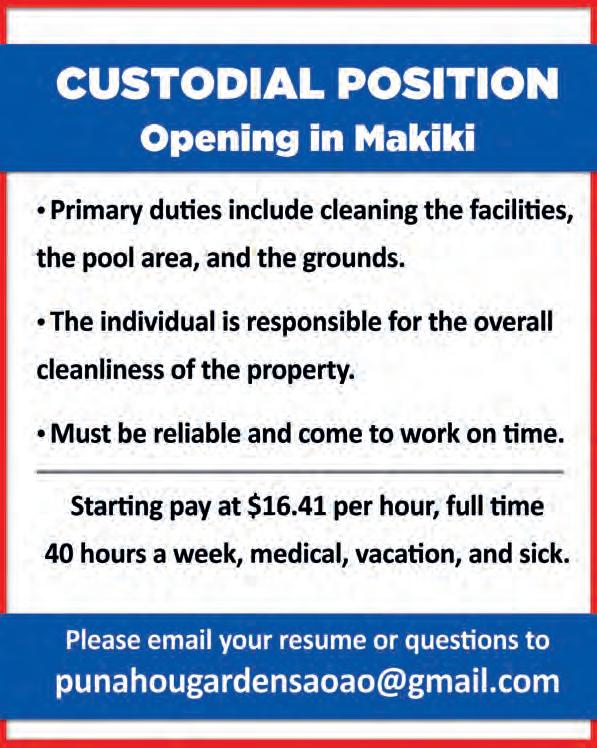
That’s just not going to happen. Again, show us projected real numbers instead of simply blurting out how much money Hawaii residents are spending in Las Vegas.
Lastly, arguing the fact that Hawaii remains as the only state to outlaw all forms of legal gambling shouldn’t be interpreted as we are the state that’s oddly being left behind and that we’re missing out on the benefits the rest of the nation are enjoying.
It could also be true that Hawaii residents just know better that to gamble away from home
who would be protecting our interests and working to help make our lives better.
In our community, Ron and his father the late Hawaii Supreme Court Justice Benjamin Menor (the first Filipino in the U.S. to serve as a state supreme court justice) and former state senator himself, was a kind of Kennedy-like family. Accomplished. Smart. Passionate and dedicated to community service. Influential. Respected. Humble. Sources of pride for our community.
Ron was a leader in what our community in Hawaii could be considered the second generation of Filipinos in public office making a difference. To name a few in this group are former Gov. Ben Cayetano, former state Senate President Ron Bunda, former state senator and former Circuit Judge Rey Graulty, former Associate Justice of the Hawaii State Supreme Court Simeon Acoba Jr.
Ron’s father Benjamin was the first generation of pioneering Filipinos of Hawaii, along with to name a few, Peter Aduja, the first FilAm elected to public office in the US., Alfred Laureta, the first federal judge of Filipino ancestry in the U.S., Eduardo
is best done away from home to avoid the traps of addiction or other social ills that gambling inflicts onto other communities.
Hawaii is a special place, isolated that we can control much of our destiny arguably better than other communities on the mainland. Take the COVID-19 crisis as an example of careful and wise management.
It’s arguable that Hawaii, with our tradition of aloha, perhaps are more cognizant and compassionate of some of our neighbors’ unfortunate life situations. We are very caring of our communities and neighbors. And when we vote down legislation that we perceive could be harmful to our neighbors and communities, it could very well be that we are excep-
Malapit, mayor of Kauai, the first Filipino American mayor of any United States municipality.
Ron’s passing is heartfelt to our community because he represented that second generation of Filipino powerbrokers now either deceased or in their sunset years. Our community was saddened when Ron lost his election to Congress because many of us felt he was more than qualified, and we rallied for that historical marker of a first Hawaii congressman of Filipino ancestry.
As expected in the last few days many Hawaii leaders have expressed statements of condolences to the Menor family and made gracious remarks of tribute.
Newly installed Governor Josh Green, M.D has ordered that the U.S. flag and Hawaii state flag be flown at half-staff at the Hawaii State Capitol and offices and agencies as well as the Hawaii National guard in the State.
Gov Green said, “Ron was a dedicated public servant, winning re-election after re-election for many years, showing how much his constituents appreciated his work on their behalf.”
Honolulu Mayor Rick
tional, even as we remain as the one state that bans all forms of commercial gambling.
Hawaii is known to the world as paradise. There are countless of other places in the world also with natural beauty like Hawaii. But we have this distinction of paradise because of our aloha and our caring people. We know that we can be a world class tourism city without having to resort to gaming. We see the social ills that can come with gambling in our many visits to the mainland. And our rejection of legalizing gambling of all forms, even as the single state remaining to do so, is actually an example of the aloha spirit and how much we care enough for our families, neighbors and communities.
Blangiardi also issued a statement: “I was surprised and saddened to learn this evening of the sudden passing of former Honolulu City Council Chair Ron Menor. A valiant public servant who served in both City and State government, Ron was a tireless leader who championed for his community and had an incredible impact on our City. We all owe him a debt of gratitude for his public service.
“On behalf of a grateful and admiring community, I extend condolences and prayers to his wife Patricia and children Benjamin, Andrew and Anthony.”
Former state senator and colleague Will Espero said “He [Ron] was committed to making Hawaii a better place for everybody. This is a big loss for Hawaii.”
Another of Ron’s colleague, former State Senate President Robert Bunda, said “He [Ron] knew how to be a good servant to the public,” he said. “He was a natural.”
Ron was also a friend and supporter to Hawaii Filipino media, including the Hawaii Filipino Chronicle.
In every campaign, Ron worked with our staff to get his message, plans and plat-
form to our readers either by interview or responding to our Q&A.
Ron’s cousin, Sherry Menor-McNamara, president and chief executive officer of the Chamber of Commerce Hawaii, who the Hawaii Filipino Chronicle also has worked with to disseminate information, said of Ron, “He always made his decisions from his heart and with a collaborative approach that made things work.
“My cousin, Ron, was truly dedicated to public service and wanted nothing more than to make Hawaii a better place to live. He inspired my pursuit of public office because of his unwavering passion for serving others. He was someone I looked up to since I was a little kid. He will be sorely missed by his family, friends and the many people he represented so well,” she said.
Besides Menor-McNamara, we’re certain that Ron was a source of inspiration to many young leaders of today.
Menor began his career as a law clerk for the Hawaii Supreme Court.
He graduated from Iolani school, receive his bachelor’s degree at UCLA, before earning his law degree at Georgetown University.
Ron will be missed and remembered.
For as long as Hawaii residents have been visiting Las Vegas, there’s been a local appetite to legalize gambling in Hawaii.
In the 1980s-1990s – before Las Vegas became home to tens of thousands of Hawaii transplants – the hype swirling around gaming in Hawaii were ambitious and supersized that would have hotels in Waikiki operate as casinos. Look out Atlantic City and Las Vegas, the mature Hawaii tourism mecca is coming after you. That’s what people thought could happen.
Since then, smaller scale forms of commercial gambling were considered for Hawaii: a Native Hawaiian casino outside of Waikiki to be operated similar to those run on Native American lands or horse racing, shipboard gambling or hosting a televised high-stakes poker tournament.
A state lottery and bingo looked to be the most palatable gambling options for Hawaii. But that and all other gaming proposals, came before a reluctant State Legislature thinking rolling the dice on legalized gambling is too risky.
When lobbying for gambling in Hawaii was at its peak decades ago, it was common to see five, 10, 15 bills related to gambling each year at the State Legislature. In recent years, it’s been far fewer bills.
Melody (last name withheld), Waipahu, and her husband Karl go to Las Vegas twice or three times a year to get “their fix,” she says of their gambling “passion.” Melody says they are not addicted to gambling but thinks, “gambling in Hawaii hasn’t been approved all these years because people fear their loved ones or they themselves could get addicted.” She adds, “It helps my husband and I that we must travel to Las Vegas to gamble. If gambling were easily accessible like 20 minutes to an hour away from our home, it’s likely our gambling fun could spiral out of control.”
She says, “Hawaii folks go to Vegas so
often. We all hear the stories of addiction. We see the construction workers still in their work clothes at casinos. Or see the young pregnant woman playing slots for hours. We see on rare occasions, people crying in the hallway while making their way back to their hotel room. Hawaii folks, many of us, know people who have moved to Vegas and end up losing big money. Couples will get divorced and come back to Hawaii broke.
“The fear of addiction, not the potential for increased violence, is the real reason attempts to legal gambling keeps failing in Hawaii,” Melody said.
• Supporters of gaming cite opportunities for new businesses in Hawaii and a jolt to the local economy.
• Lawmakers look at the potential to bolster state revenues with legal gambling.
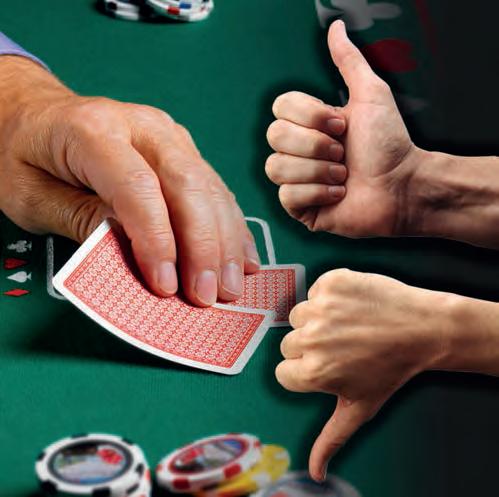
• New gambling businesses could be taxed at a very high rate which monies can support state programs and services from education to building affordable housing projects, lawmakers say.
The additional stream of income for the state would also come without raising taxes on local residents and businesses.
Allan Alvarez, Kapolei, supports legal gambling in Hawaii. “I think the additional state revenues will justify gaming in Hawaii. At the same time, though, we must have oversight to make sure funds that are to go to the State, actually go to programs for the state. Too many times [where gambling is legal], corruption sets in and funds are diverted or mishandled. If we do set up a casino in Hawaii, there must come along with it, good fiscal management,” Alvarez said.
Instead of the limited proposal in the latest gambling bill, Alvarez supports a full-scale casino in Hawaii. Alvarez said the bill is a start but could fall flat because of the limited scope of gambling. His choice of gambling is table games.
Alvarez says he is a rare gambler who
does it only while on vacation if the opportunity arises. He’s gambled on several occasions in the Philippines and in Las Vegas.
“I think following the path of Indian reservations hosting, owning and operating casinos would be very good for Hawaii and its residents. Most gaming operations set aside money to fund community activities and having a casino in Hawaii will help raise much needed additional revenues for the community.
Mark Ruiz, Pearl City, 55, said he doesn’t have any strong opinions on gambling as he used to. Over the years he said he’s been to Las Vegas about 20-25 times. “At this point I understand it’s rare for people to win. The last few times I’ve been there I would spend most of my time going to shows. Now in my later life, I’ve exhausted all that passion for casinos or gaming. I lost a lot of money over the years. Vegas was fun, but I do have regrets.”
Hawaii remains the only state that bans all forms of commercial gambling. All 49 states have some form of legal gambling from full liberal codes to a select, few options. The fight to legalize gaming in Hawaii remains contentious and passionate on both sides. With new technology and new modes of gambling, State Legislatures across the nation are reassessing their gaming options. Could these new gaming options finally entice Hawaii to join the rest of the nation in legalizing gambling?
Representative John Mizuno introduced a Sports Gaming Bill that aims to make sports book and card room legal. As of press time, the bill passed first reading. Legal sports betting is becoming increasingly popular since becoming federally legal in 2018. 31 states and the District of Columbia have some form of sports betting.
The card game would just be for one game, poker, Texas Hold’em. While slots are popular among Hawaii residents, there will be none of them, Mizuno told Maui news.
Governor Josh Green said he’s willing to consider what lawmakers come up with.
“We need revenue for our state but the revenues if you are not careful do come from those who are tending to have economic problems or challenges,” Green said. “So, I’d like to be careful.”
Mizuno said in a press release, “With Hawaiʻi residents dropping a billion dollars to Las Vegas, Nevada every year, I think a sports and card gaming bill warrants at least a discussion. If crime is associated with gambling, why is gaming legal in 48 states and why are so many Hawaiʻi residents going to Las Vegas, with many taking multiple trips? The people I know who enjoy trips to Las Vegas are mostly kūpuna, not criminals. I feel it is important to discuss options to keep local money in the local economy.”
A popular destination for Hawaii tourists, downtown Las Vegas hotels owned by Boyd Gaming alone reported it earns about it earns about $600,000,000 from Hawaiʻi visitors each year, Mizuno quoted a Honolulu Civil Beat article.
Chair Daniel Holt said the bill addresses some of the concerns of the past regarding gambling. There would be no virtual participation linked to the Oahu gaming facility. All gambling will take place at the authorized site, which would appear closer to gam-
ing rooms or gaming parlors in a neighborhood setting versus a large full-scale gaming establishment of the casino-type.
Those parlors would still be attractive to those used to going to Las Vegas.
Customers would only be allowed to enter the sports book and card room after registering with the premises and paying a daily entry fee.
The gaming rooms would be heavily taxed (on sports betting could be as high as 55%). Some of that money would go to law enforcement, for gambling addiction programs, affordable housing, to Hawaiian Homelands and education for kids, Mizuno said.
Some states use gambling taxes to support social programs and education. In New Mexico, the state grants its residents paid tuition at state public universities. That state collects $63.5 million from its state lottery.
Both Mizuno and Holt, who represent parts of Kalihi, hope the bill will encourage Hawaii residents who frequent Las Vegas to stay home and spend their money in Hawaii to help boost the local economy.
Both Mizuno and Holt are aware of the illegal gambling in their districts and others. Holt said, “Being practical and knowing that these things are taking place on our streets every day. To make like we are introducing something new is false. We are taking an industry that is being unregulated and putting it into regulation and benefiting our communities at the same time.”
The proposed legal gaming rooms would offer a safe alternative to illegal gaming dens where prostitution and other crimes occur.

Mizuno said thousands of people from Hawaii also gamble on illegal websites that are offshore. There is also illegal cock fighting.
Some experts believe the opposite could happen or nothing at all when it comes to legal gambling reducing illegal gambling.
Revenues may not be substantial as estimated, Vegas will still draw Hawaii locals, Keep Hawaii as is
Some who oppose gambling in Hawaii don’t believe the central argument that because Las Vegas draws many Hawaii tourists, there is a built-in customer base just waiting to gamble as soon as the state legalizes it.
Melody said she and her husband would still go to Las Vegas if Hawaii suddenly had places to gamble legally. “Even if Hawaii offers gambling, many Hawaii folks will continue to go to Las Vegas. The sports betting and card room proposal this year has nothing on Vegas. People like to gamble because they are on vacation. People on staycation wouldn’t immediately think they want to gamble, especially if it’s in a ‘room’ or regular building, compared with the grand casinos and exciting entertainment in Vegas.
“I think the amount of captured taxes from legal gambling establishments in Hawaii will not be considerable enough to outweigh the harm gambling does. The state could bring in more money, but it will most likely pay for it in increased social needs. Some social experts say legalizing gambling in Hawaii could increase drugs, crime, addiction, and poverty. For this reason, gambling is often called a zero-sum game.”
Roland Casamina, CEO and President, House of Finance Inc, goes to Las Vegas at minimum once a year to entertain clients and companies that he does business with or to reward employees for a good year. While in Vegas, Casamina doesn’t gamble. Instead, he enjoys the shows.
He said of the proposed bill to bring legalized gambling to Hawaii, “I don’t support small gaming operations. There will still be a want and need to go to Vegas. Somehow the feel about Vegas with the Mega gambling casinos still will draw the typical Hawaii resident. Secondly, making Hawaii like a gambling Mecca like Vegas will also erode the infrastructure, and the repu-
tation of Hawaii being Paradise.”
Rose Cruz Churma, Kaneohe, said people are drawn to Las Vegas not only because of gambling. “My guess is that even if casinos are available here, there still would be interest in visiting Las Vegas.”
Churma never gambles besides betting on a mahjong game and election. She opposes full-scale casino gambling and the current proposal at the State Legislature. “Let’s keep, Hawaii, Hawaii. We don’t want to be a mini-Vegas. If a gaming room opened, Churma would’t go to even visit.
Churma has been to Vegas once and that was enough, she says. “The place is fake—fake pyramids, fake Venice…most attractions are replicas of popular destinations. Where’s the originality there?”
to family Myra (requested anonym-
ity, not her real name), Waipahu, is against legalizing gambling in Hawaii. Myra says she has personally seen for herself the devastation gambling can have on families. “Instead of paying attention to their children and family, fathers of these children who are fond of gaming and gambling do not focus on bonding with their children and spend a lot of time gaming online.
“In addition, if you are not financially well off, your financial resources will suffer resulting in catastrophic consequences like losing your house and ‘other valuable things.’ Hawaii will never be like Las Vegas and will not be a gambling mecca. We do not want that to happen. Besides, Filipinos like to have a change of scenery when they gamble. So that’s why we go to Vegas and will probably keep going even if Hawaii lawmakers legalize gambling.”
“I don’t support small gaming operations. There will still be a want and need to go to Vegas. Somehow the feel about Vegas with the Mega gambling casinos still will draw the typical Hawaii resident. Secondly, making Hawaii like a gambling Mecca like Vegas will also erode the infrastructure, and the reputation of Hawaii being Paradise.”
– Roland Casamina CEO and President, House of Finance, Inc.By Emil Guillermo
And we’re off into the deeply divided world of politics. It took some flips, and I don’t mean Filipinos.
After 15 rounds of votes, the Republicans finally were able to do the easy thing. The new majority was finally able to muster enough votes to elect a speaker of the house, Kevin McCarthy (R-Bakersfield).

But it came at a price. Four days of embarrassment, complete with a near brawl on the House floor. Can Republicans lead a divided government in a divided country? The Republicans couldn’t even lead and govern themselves.
We just saw how the longganisa is made in the House.
Do you want to eat that?
It took 15 ballots for a majority to select the Speaker. The last time that happened in Congress was 100 years ago. And we should remember how that particular Congress treated Asians. It wasn’t nice. More on that in a moment.
Still, that’s not the history people focused on. Instead, the focus was on the history of January 6 and how in 2021, a violent mob tried to stop the certification of a free and fair election and disrupt our democracy.
People lost their lives that day, including five Capitol police officers and 140 were seriously injured. On the Capitol steps, to mark the fateful day, Democratic leader Hakeem Jeffries led a bell-ringing ceremony in their name.
But we cannot forget how close we were to the bell ring-
ing for all of us. That’s how close we were to losing our country.
Two years later, there was no violence, but there was still a mob. The effect of the right-wing bloc by MAGA/ GOP members to elect a new Speaker of the House of Representatives is almost the same.
As long as there was no speaker, the House can’t function, pay bills, or assign committees. In an emergency, it couldn’t convene the intelligence committee.
Without a speaker, the nation’s congressional branch is totally stymied and rendered useless.
Any country, the Philippines even, could have attacked the U.S. and the House would have been unable to act.
This would be a good day at the office for any Proud Boy or Oath Keeper. And some of the members voting on speaker even voted to decertify the legitimate election.
The five main members who immobilized the House were Matt Gaetz (R-FL), Bob Good (R-VA), Paul Gosar (RAZ), Lauren Boebert (R-CO) and Andy Biggs (R-AZ), who essentially held the government hostage.
All of them are Trumpettes, and all voted to decertify the 2020 election. Election deniers? That’s a nice term. They did the bidding of the January 6 insurrectionists. And they had a stubborn sense this time much like the former president. They were shamelessly unwavering in their intransigence—against fellow election denier Kevin McCarthy.
Their five votes were all it took to deny the presumed GOP majority leader McCarthy the speakership from the number of votes he needed—218.
Up recently, McCarthy ended up with around 200 votes. McCarthy was denied 14 times. That’s more times than Peter denied Jesus. But McCarthy is no Jesus. So, maybe he deserves multiple denials.
Remember House Res. 908 in 2020? It was Rep. Grace Meng’s legislation that condemned the anti-Asian hate rhetoric of the pandemic, phrases like “Chinese Virus,” “Wuhan Virus,” and “Kung-flu” that perpetuated anti-Asian stigma.
The resolution also called on public officials to denounce all expressions of racism, xenophobia, and scapegoating, as well as collect data on the rise of hate crimes during Covid-19. It was intended as real action for the number of Filipino Americans victimized by hate transgressions during the pandemic.

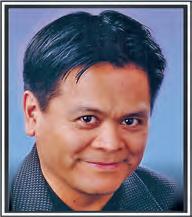
Who could be against that? See, all the NO votes (mostly Republican) at this link. It’s astounding. Biggs and Gosar were among the NO votes. But so were McCarthy backers like Jim Jordan and Steve Scalise.
Not surprisingly, McCa-
rthy himself was one of the loudest no votes calling the resolution a waste of time. For that alone, McCarthy deserved to be put through the wringer.
It was 100 years ago that it took multiple ballots to get to a speaker—nine rounds of ballots in 1923. McCarthy had that by late afternoon Jan. 12. But the number got to 15 ballots the next day when enough of the 20 Republicans flipped their votes and enabled McCarthy to win.
But it comes at a cost. McCarthy was accused of “selling shares of himself.” And there’s still discussion about the particulars in concessions to his detractors, like the ability to call a vote to vacate McCarthy on just one vote. Based on what rules are approved this week, McCarthy will be as powerful as a removable hood ornament.
But it’s that coincidence of the multiple ballots in 1923 that is an Asian-specific policy worth remembering now. Back then, America was just as divided on many of the same things that divide us now.
When the quota was zero
And this is where your Asian American history comes in.
The Congress that struggled to vote for a speaker in 1923, ultimately went on to produce what was one of the most racist and xenophobic immigration laws in American history. The Immigration Act of 1924, aka the “Oriental Exclusion Act.”
It set quotas for immigration visas to two percent of the total number of people of each nationality in the 1890 census. But it set Asian immigration to zero.
The quota was zero.
Chinese were already excluded from entering the U.S. in the 1890s. But this law updated that sentiment and lumped all Asian countries together, with two exceptions.
 By Renelaine Bontol Pfister
By Renelaine Bontol Pfister
As we stand at the beginning of 2023, our editors at Hawaii Filipino Chronicle asked, “What is your outlook for the new year? If you can change things about yourselves and the world, what would you wish to do?”
Do we have lofty dreams, or humble ones? Are our answers fitting for beauty pageants: good health and world peace?
Darwin, a small business owner of HNL Ballpark Batting Cages says inflation and the high costs of running a business make it challenging to do what he loves.
He says, “We already took a chance by opening during the COVID-19 era, and now we face more economic challenges with high inflation costs across the board.” Still, he hopes to con-
tinue to serve the community.
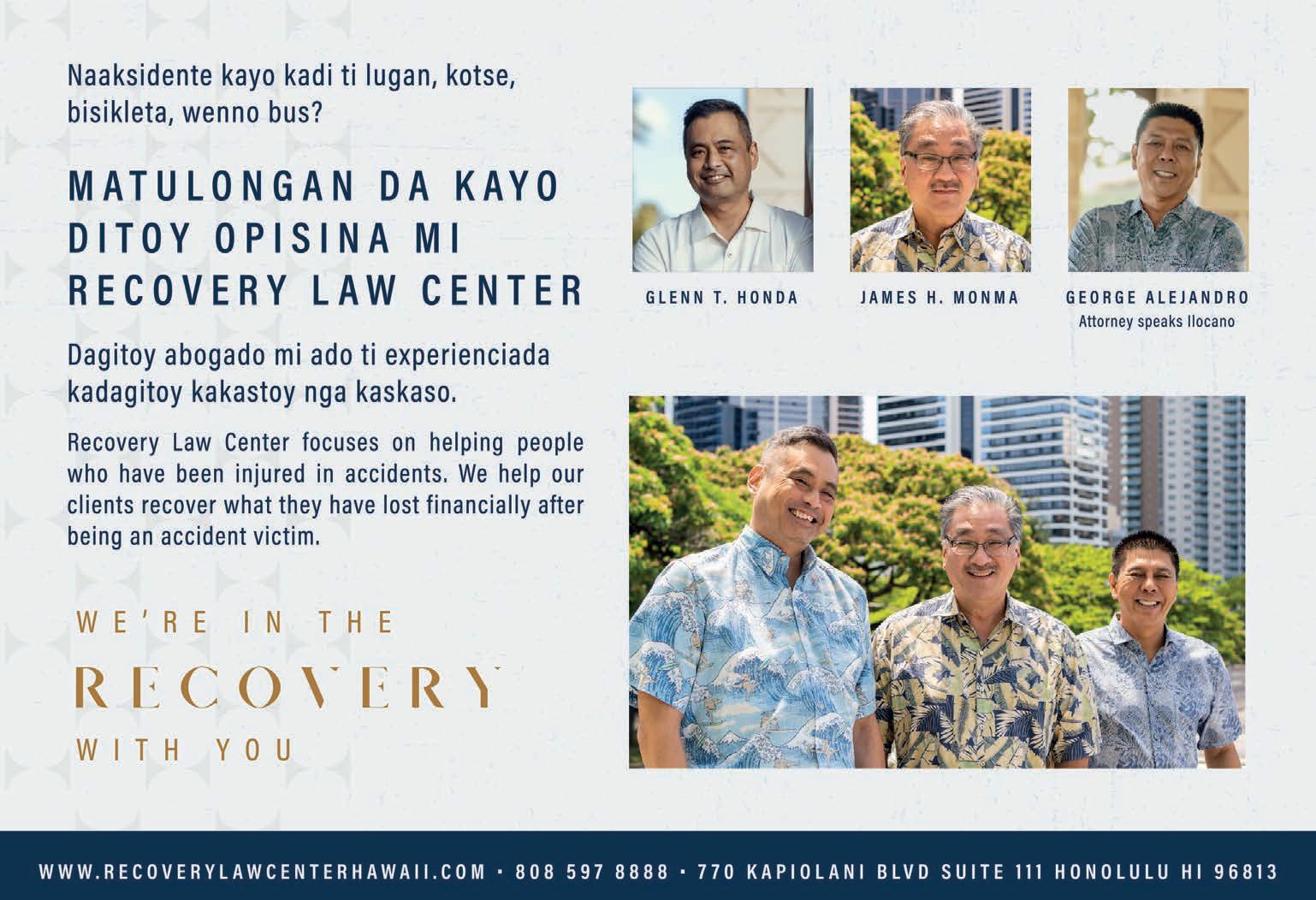
Darwin’s wife, Ava, who helps run the business and is an Occupational Therapist, says this year she would like to “Worry less and keep a positive outlook. Worrying about things that have not happened has been causing me less sleep at night and unnecessary use of my time.”
She doesn’t have to search far to find inspiration. She says “I admire my husband’s positive outlook in life and want to be more like him in this aspect. He doesn’t give up despite being born with club feet and losing his mother a few years ago. He has persevered and stayed positive despite all his pains in life.”
Jim, who turned 50 on the 50th State a few months ago, says, “There is a traditional Korean drinking etiquette where you pour drinks for others when their glasses are empty.”
One never pours his own
glass. He thinks there is a lot we can learn from this.
“When we think of others first and help those who are less fortunate, we make others happy. And eventually, that will make its way back to us. It seems like a simple thing to do, and we may have heard it many times before, but very rarely do we act on it. That’s what I, and hope others too, would do more this year,” he said.
Cindy, a physical therapist assistant and mother of three, says her outlook for 2023 is one of hope and re-
newal. “Many people I know personally and globally have suffered personal losses and difficulties. This new year looks promising, offering opportunities for healing and rejuvenation,” she says.
She continues, “If I could change things about myself this new year, I would try to balance my time better to allow more rest and relaxation. By being in a better mental state of mind, I can help others more effectively in my personal life, with work and in the community.”
Meanwhile, Sheila, a physical therapist and mother of 6-year old twin girls (who are in love with dragons), wants to “Continue to be more receptive of other people’s viewpoint and beliefs that don’t align with mine and to actively remind myself that someone’s conviction or faith does not define the person as a whole. Just because a person does not subscribe to a certain religion or a political
affiliation does not mean that the person is not good or the person is obtuse.”
If she could change something, she would address “cancel culture,” a form of ostracism that has become familiar in this social media-centered environment.
Sheila says “A tweet, a picture, or a comment that was touted 10, 20 or 30 years ago should not be the basis for that person to lose their livelihood or for their reputation to be tarnished. I try to subscribe to the idea that most people’s perspective and inclination can change over the years and their current attitude and action should be the grounds on how we form our opinions of them and how we proceed with our interactions.”
I applaud these answers, which focus on positivity and the betterment of society. And if you ask me, good health, and world peace sound like wonderful goals to aspire to in the new year.
Longtime community leader, Geminiano “Toy” Arre, Jr. embodies the University of the Philippines’ (UP) core values of Honor and Excellence, says UP Alumni Association of Hawaii (UPAA-Hawaii).
Arre was the longest-serving Executive Director and Chief Operating Officer of the
Filipino Community Center. He is also the first Filipino to hold a cabinet position in the City and County of Honolulu. Moreover, he served multiple leadership positions including Director of Housing and General Manager of Faculty Housing at University of Hawaii, and Executive Council for Volunteers at AARP.
Most notably, Arre is the founding president of UPAA-Hawaii when it was still called the UP Club of Hawaii.
On January 29 at 5:30pm, UPAA-Hawaii is celebrating Arre’s achievements and leadership in the Hawaii-Filipino community. The event is called “Tribute to Manong Toy Arre” and will be held at the Filipino Community Center in Waipahu.
UPAA-Hawaii invites sponsors, advertisers, and individuals to attend the event and honor Arre’s excellency. There will be dinner, fun games and silent auction at the event. Ticket starts at $85. To register, visit upaahawaii.org. For inquiries email Melody at melodycalisay@aol.com for sponsorship details and Raymund at rliongson@gmail.com for advertising details.
Filipino American Ron Menor, a longtime politician that dedicated decades of service to both Hawaii and the Filipino community, has died at age 67.
In a statement on Jan. 17, Gov. Josh Green announced Menor died unexpectedly on Jan. 16 due to a medical emergency.
“Ron was a dedicated public servant, winning
re-election after re-election for many years, showing how much his constituents appreciated his work on their behalf,” said Gov. Green.
“Jaime and I send our love and condolences to Patty and her ohana and know that the community Ron served for so many years, is also in mourning.”
As a politician, Menor held numerous public office
positions during his career. He was a former State Senator, State Representative and Honolulu City Councilmember representing District 9. He studied at Iolani School, University of California-Los Angeles and Georgetown University Law Center.
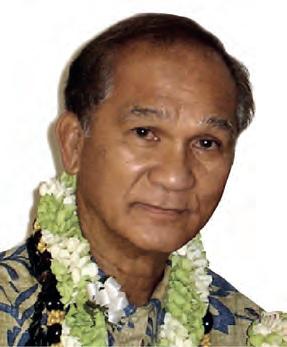

Before a career in politics, Menor served as a law clerk in the Hawaii Supreme Court and later as a Deputy Attorney General for the State of Hawaii. He later established his own law practice.
As a Filipino American, Menor relentlessly supported Hawaii Fil-

ipino Chronicle (HFC). He was a former HFC contributing writer for many years.
Born and raised in Hilo, Menor was the son of late Hawaii Supreme Court Justice Benjamin Menor.
In a 2022 interview with HFC, the younger Menor said:
“He [my father] fought for the betterment of working people and equality of opportunity for all of Hawaii’s residents. These are causes that have also motivated me in my career in public service.”
Menor is survived by
his wife Patricia Leong and three sons, Benjamin, Andrew and Anthony.
Technology makes life easier but for the elderly, learning to use technology is a harder task. That’s why AARP Hawaii and Senior Planet Organization are offering free webinars to kupuna to teach them to use technology to its fullest capabilities.
From February 10 to March 10, a 12-1pm online class on Fridays will specialize in creating an online community and classes for Kupuna to learn everything from smart TVs, smart watches, Google work tools, cloud computing, virtual payments and even Spotify.
Here’s a full list of Friday classes and topics to be discussed:
• Feb. 10 – Live Streaming and Smart TVs
• Feb. 17 – Wearables and the Internet of Things
• Feb. 24 – Introduction to the Google Workspace
• Mar. 3 – Understanding Cloud Storage
• Mar. 10 – Introduction to eBay and Paypal
• Mar. 17 – Introduction to Spotify
To register, visit events.aarp.org/HITech. Moreover, Senior Planet offers a free technology hotline that kupuna can call with questions about technology. They also help those who are planning to register for the classes and setting up the online classes.

hile the process that the GOP went through in selecting the Speaker of the House took too long, rigorous, combative, and full of negotiations, I would say that Kevin McCarthy’s quest for the position was a lesson of persistence, guts, and determination.
McCarthy didn’t give up despite many losses, setbacks and failures, but instead persistently pursued his longtime goal of becoming the Speaker of the House. But will this be an asset for him in governing the House of Congress? Or this will weaken him?
After the 15th and final round of voting, McCarthy was finally elected House Speaker after days of painstaking negotiations and failed votes, garnering a total of 216 votes and six voting present, enough to propel him to the speakership.
I would say, this is the greatest example of persistence, guts, and determination to the highest degree because an ordinary person will
give up after two, three or four tries. All he must do now is to carry out all the promises he committed and pursue the concessions he negotiated.
McCarthy, to secure the gavel, had to overcome the opposition from a group of hardline conservatives in what became the longest contest in 164 years.
To prevail over critics, McCarthy and his allies made a series of concessions to conservatives – a move that frustrated moderates concerned the concessions may make it harder for the new GOP majority to effectively govern.
McCarthy’s struggle to get the position may serve as a preview of the kind of challenges he will face in trying to unite his GOP colleagues during his incumbency. The deal-making McCarthy went through may also weaken his position in the performance of his duty as the house speaker, although he disputed that idea. Well, let’s see because conceding is negative per se and hard to cope with its implications.
The final hours before McCarthy was elected ended with chaotic and tense moments on the House floor with lawmak-
ers on the edge of their seats waiting for further developments. The situation was very volatile and intense, but in fairness to him, he was able to weather the storm and survived the chaotic situation.
With so many concessions and promises, McCarthy and his allies may have rough sailing in governing as Congress continues its first day of session for the new year.
Based on CNN reporting, there were 11 key concessions made.
First, CNN reported that “any member can call for a motion to vacate the speaker’s chair – this is significant because it would make it much easier than it is currently to trigger what is effectively a no-confidence vote in the speaker. Conservatives pushed hard for this, while moderates are worried it will weaken McCarthy’s hand.” Well, the way I see it, it may weaken McCarthy’s position and will keep him always at the edge which might be a distraction on his part.
Second, “a McCarthy-aligned super PAC agreed to not play in open Republican primaries in safe seats.” This will give no outside interfer-
ence such that GOP can work within or among themselves.
Third, “the House will hold votes on key conservative bills, including a balanced budget amendment, congressional term limits and border security.”
Fourth, “efforts to raise the nation’s debt ceiling must be paired with spending cuts. This could become a major issue in the future when it is time to raise the debt limit to avoid a catastrophic default because Democrats in the Senate and the White House would likely oppose demands for spending cuts.” This is where caucuses and bipartisanship can come in.
Fifth, “move 12 appropriations bills individually, instead of passing separate bills to fund government operations. Congress frequently passes a massive year-end spending package known as an “omnibus” that rolls everything into one bill. Conservatives rail against this, arguing that it evades oversight and allows lawmakers to stick in extraneous pet projects.” This calls for individual scrutiny instead of a bunch of them at the same time.
Sixth, “more Freedom Caucus representation on committees, including the powerful House Rules Committee.”
This will provide diversity in various committees which can explore more ideas based on culture and environment.
Seventh, “cap discretionary spending at fiscal 2022 levels, which would amount to lower levels for defense and domestic programs.”
Eight, “seventy-two hours to review bills before they come to floor.” This will give them enough time to process the bills before voting.
Ninth, “give members the ability to offer more amendments on the House floor.” This will also diversify the content and make it more substantive.
Tenth, “create an investigative committee to probe the “weaponization” of the federal government.” “Weaponization” has been a problem so it needs to be scrutinized.
And the eleventh, “restore the Holman rule, which can be used to reduce the salary of government officials.”

There you go, while McCarthy was able to push himself up to the speakership, will this be a sign of positive governing on his part or one that will weaken his authority over the legislators?
ELPIDIO R. ESTIOKO was a veteran journalist in the Philippines and a multi-awarded journalist here in the US. For feedbacks, comments… please email the author at estiokoelpidio@gmail.com.

The Japanese had a so-called Gentlemen’s Agreement in 1907 to limit Japanese immigration to the U.S.
And then there was the Philippines, a U.S. colony at the time. Their colonization enabled Filipinos to travel freely to the U.S.
Not exactly lucking out, considering how Filipinos fared in America at the time, mostly as field hands and migrant workers. But it was better luck. Every other Asian ethnicity was locked out.
To what end? As the Office of the U.S. Historian points out, “the most basic purpose of the 1924 Immigration Act was to preserve the ideal of U.S. homogeneity.
It was America’s anti-di-
versity, white purity sentiment of the day. Let’s all be the same, namely, pure and homogenous. Just not Asian. And a big part of that movement was in California, a reaction to where most of the Asians in the U.S. resided.
I’m sure there are more than a few current members of Congress who dream of passing an exclusionary immigration law like the one in 1924.
That would be a step too far backward, right? But have you heard the modern racist anti-immigrant rhetoric of white supremacists in the last few years? Of the Proud Boys and the OathKeepers?
Ask folks who were at the Capitol on Jan. 6, 2021. Or the main bloc of five that kept the House from electing Kevin
McCarthy speaker on Jan. 6, 2023, until that 15th round.
We aren’t so far from the politics of 100 years ago than you think. What’s more unsettling, as bad as McCarthy is, the people who were blocking him to be House speaker are far worse.
This is the politics of the new 118th Congress. It’s Republicans in an intra-party gridlock before they take it to the Democrats for traditional inter-party gridlock.
It’s the future of governing the next two years in the country that is supposedly the model democracy of the world.
EMIL GUILLERMO is a journalist and commentator. His talk show is on www.amok.com.
Hawaii’s population declined again in 2022, and that’s not good.
More than 15,000 people left Hawaii for the mainland last year, according to the U.S. Census Bureau. Counting births, deaths and immigration from other countries, Hawaii’s population declined by almost 7,000 people.
This is the sixth year in a row that Hawaii’s population has fallen. Too many of our families, friends and neighbors are having to say aloha to the islands they love and call home.
Some people have suggested that this is actually a good thing. Hawaii already has too many people, they say, and fewer people will mean less traffic, less crowded parks and beaches, and so on.
But whether Hawaii is overcrowded is not really the issue. Those who applaud this exodus of Hawaii residents to the mainland still need to consider this question: Why are they moving away?
Survey results show that Hawaii’s high cost of living is the main reason. Food, housing and transportation simply cost too much here. Add high taxes and inflation on top of that and it’s no surprise so many people are leaving.
The Grassroot Institute of Hawaii has a section on its website called “Why we left
Hawaii.” It contains the stories of dozens of island residents who moved away, and they almost all say the same thing: States on the mainland have more jobs, lower prices and lower taxes.
Many of Hawaii’s young people have left the islands to pursue opportunities in innovative fields such as technology or scientific research. When they leave, Hawaii loses out on their talents and ingenuity.
This ongoing exodus also leaves our remaining residents with bigger tax bills, since the costs of operating Hawaii’s state and county governments typically do not go down. Even though Hawaii’s population has declined, the state budget hasn’t. Lawmakers project it will reach $18 billion next year — the largest in
state history.
But the emotional toll this takes might be the greatest consequence of all. As anyone who has had a family member move away can tell you, the loss can be heartbreaking. It isn’t easy for anyone to leave a place their family has called home for generations and returning to the islands for visits is not usually cheap.
Former Wahiawa resident Colyn Slocum, who now lives in Nevada but was born and raised in Hawaii where his family has lived for generations, told the Institute recently about why he decided to leave Hawaii.
“The taxation rate leaves you with barely half your paycheck, and city services fail to make up for the lost income,” he said. “And so many jobs fail to provide adequate ben-
efits to make up for the poor pay.
“It was made all the more difficult by the fact that nearly half of my cousins had already left, so there were that many fewer of us who could help care for my aging parents.”
Unfortunately, thousands of individuals and families are in that same boat. Their families live in Hawaii, but they cannot afford the high cost of living.
As the 2023 legislative session begins this month, state lawmakers should keep these people in mind and look for ways to make Hawaii a place more residents can continue to call home.
KELI‘I AKINA is president and CEO of the Grassroot Institute of Hawaii.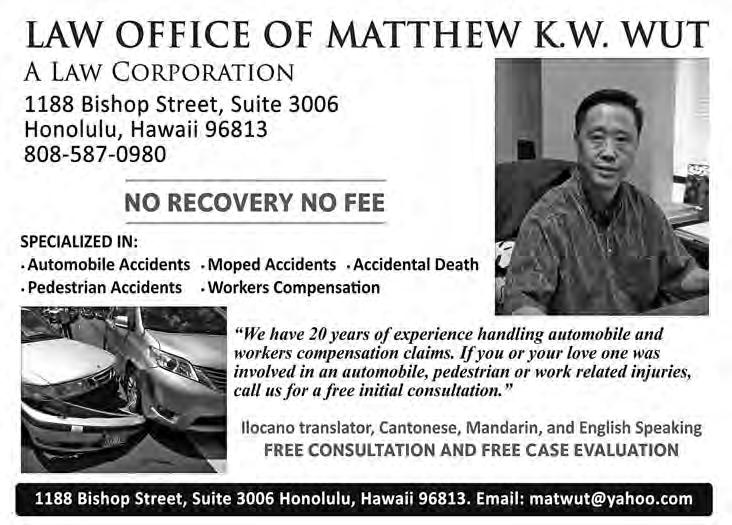
My Filipino culture has influenced my outlook on life because I strongly desire to learn more about it. My family left Bohol and Cebu in the Philippines more than a hundred years ago to come to Hawaii. They brought their culture and integrated it with the local culture here. Over time and throughout multiple generations, the language and culture began to disappear. However, I want to explore my culture and hopefully, one day travel back to where my family is from and be the first to reconnect since my great-great-grandparents.
Although there is a gap between my heritage and me, I hope to search out, reconnect and bring back the Filipino culture to my family.
By winning this scholarship, I hope to discover my heritage and be more involved in the Filipino community here in Hawaii and possibly be able to use the platform to make oth-

ers more knowledgeable of the opportunities that students have within the community as well.
My future career in journalism would benefit the Filipino and general community by driving a focus on intercultural communication and amplifying the voices of the Filipino community.
There are many stories to be shared and I’d like to dive into the stories of Filipino families who came during the plantation era and be able to hear their experiences and share them.
I would contribute to Hawaii’s future growth and development because of my focus on civic responsibility, historical knowledge and cultural awareness. During high school, I was given a platform as the commander of an organization, JROTC, that allowed me to organize community service events and teach others the importance of helping a collective of individuals rather than a focus on individualistic needs.
In college, I joined Silver Wings, a nonprofit that expanded the mission of selfless service to the community and leader-
ship development nationally. As an active member for several years, I’ve made connections and aided the community while expanding my knowledge of its challenges and trying to collect resources and develop plans to help fix them.
I am currently the president of Silver Wings Hickam Chapter and can lead and perpetuate the mission of cultivating leadership and personal and professional development in college students aiming
to be civilian community leaders and future military officers.
One of our main focuses is bridging communities and creating open dialogues between the citizens of Hawaii, the Hawaiian community and the military. We create pathways of communication to address challenges that each community faces while promoting diversity and inclusion and amplifying indigenous voices.
We bring in guest speakers from underrepresented communities to talk and encourage our members, many of whom are Filipino. Our primary staff com-
prises four officers of Filipino descent, and we aim to influence other leaders of cultural backgrounds to take up leadership roles within their community.
By encouraging and aiding students in college to take up these leadership roles, the impact I hope to have lies less in what I can do as an individual, but in the value of what the others who go through the organization can do for the community as a collective, both currently as students and when they graduate and take the lessons they’ve learned with them into whichever field they pursue.
 By Rose Churma
By Rose Churma
This is the second volume on values in the Filipino Diaspora that the FAUW, a Hawaii-based nonprofit organization, has recently published.
Released last December 2022, this book is an anthology of writings by 24 authors who have ventured to different lands—from Europe to the U.S. continent, including Hawai’i. The narratives and poems are about immigration and adaptation, covering universal values but also getting personal akin to mini-memoirs.
As noted in the book’s back cover: “The authors’ journeys tell of family, obligation, pluck, resilience, and determination. Beliefs and values are discarded, modified, and even strengthened as they navigate their life passages.”
In the book’s foreword, editor Virgie Chattergy explains how the book’s concept came about. The organization that initiated this exercise has the mission to “cultivate an understanding of Philippine history and culture.”
And the essence of the Filipino, wherever they are, is best represented by what they value. She continues:
“Values provides us with a sense of identity, individually and collectively. They are a source of pride and create for us a social network… connects us with our past, give relevance or meaning to our present, and can help direct us as we move forward.”
Like the process used in the first book -- Pinay: Culture Bearers of the Filipino Diaspora -- a “call for papers” was sent out to those who have experienced living outside of the homeland, with instructions to contributors to share remembrances of Filipino cultural values, with the hope that the younger generation can be linked to their ancestral heritage.
Interestingly, one of the first submittals we received was from a high school student from Waipahu. Ashley Valois submitted a short poem with the first lines: “That is not my dream, I say / “Get money. Fast education. Become a nurse.””
And she ends the poem with a fiery: “Ripping away the hand that holds my throat / and say “No.”/ My dream will be my own.” Ashley eventually majored in political science and intends to go to law school.
This topic is picked up in other articles. Elizabeth Jocson narrates how her dad insisted that she take up nursing—so she enrolled in a nursing course—until she had to assist in surgery that involved stapling the stomach of an obese patient.
In Pepi Nieva’s “Jo Koy and Me,” she dissects the comedian’s popularity and the themes of his stand-up comedy act that pokes fun at his Pinay mom’s quirks and other Filipino stereotypical propensities.
One of which is why Filipino moms want their kids to be a nurse. In his comedy acts, he would announce:
“There are a lot of Filipinos here right now that are nurses. This is a good time to be injured in a show!”

Coincidentally, this anthology boasts of several authors who are nurses. Lillian Ponce Manangan’s paternal grandfather was one of Hawaii’s sakadas who used his earnings to buy land and returned to farming in the Philippines.
Although Divina Telan-Robillard is also a nurse, she does not mention this at all in her narrative, but her status as “Mistress, Madrasta, Ina” is also the title of her piece.
Katherine Baltazar’s paternal lineage (her father is Filipino while her mother is Swiss-German) is mostly in the healing field, so it was not surprising that she and her sister became nurses.
Another recurring theme is the Filipina immigrant’s ability to adapt, and even thrive because of their multilingual skills as described by Josephine Pablo in her article “Blessed Are the Bilinguals” where she admonishes others to “…Be multilingual and be thankful for your ability to speak two or more languages… for you can have the best of many worlds.”
This is reinforced by Malou Soto Reininger, a Filipina who now calls Vienna home. She confesses that she first spoke Tagalog
when she was seven, which served her well in her education since English was the Philippines’ medium of instruction. This also helped her learn German—and her multilingual skills were put to good use when then-President Fidel Ramos and his entourage visited Vienna.
Rosemarie Mendoza also relates how she was placed in an ESL (English as a Second Language) class at Kalakaua Intermediate when she first arrived in Hawaii—an automatic placement if one is an immigrant, even if one is already fluent in English.
In order to be placed in regular English classes, she volunteered to serve as an interpreter and translator— which eventually helped her as a human resources professional in the visitor industry.
Fe Baran’s daughter, Catalina Lehrer, on the other hand, lamented the fact that her mom never taught her and her sisters Cebuano or Tagalog. “I would have loved to be brought up bilingual,” she writes, considering that her mom taught English as a second language.
The most memorable piece is the poem by Nilda Boland—written with passion and fury after a high-ranking official in the Philippines’ foreign service disparaged the use of Tagalog/Pilipino. Written in the Philippines’ national language, the poem’s English translation is also included.
Two of the writers tackled the issue of “looking different” or the physical features that make it difficult to blend in.
Gloriani “Keeyan” Lontoc, a thirty-something Filipina now based in the UK writes, “My accomplishments, my beauty and successes as a person sat dormant in the shade of the pressure to be light, to be pretty.”
Rene Brock, who was adopted by Caucasian American parents at 13 days old and now lives in suburban New York, describes herself as an American woman in a Filipina body. She recalls being bullied while in school because of her Asian features, and her desire to look like a pretty American girl—blonde and blue-eyed, just like her Barbie doll.
This anthology is an interesting mix from a diverse group of authors. Rolando Santos, the only male in the group summarizes his article thus: “…analyzes with heart and humor the dynamics of the transmission of traditional Filipino values.”
To some degree, this description covers the musings of the other authors whose journey beyond the shores of the motherland had strengthened them and made them appreciate more the threads of their being that are uniquely Filipino.
The book’s cover is local artist Eddie Joaquin’s portrait of “Rosa Maria.” It reflects the duality of Filipinos who must adapt to their new lives while holding memories and values of their homeland close to their hearts.
For those interested in meeting the authors, a virtual “meet and greet” event is planned for January 24, Tuesday at 4 p.m. HST or January 25, Wednesday at 10 a.m. in the Philippines. For additional details and Zoom links, please email kalamansibooks@gmail. com.
ROSE CRUZ CHURMA established Kalamansi Books & Things three decades ago. It has evolved from a mail-order bookstore into an on-line advocacy with the intent of helping global Pinoys discover their heritage by promoting books of value from the Philippines and those written by Filipinos in the Diaspora. We can be reached at kalamansibooks@gmail.com.
agdadala ba kayo ng sibuyas?”
(Will you bring onions?), asked my brother who lives in Canada.
My sister who lives down under replied, “Baka magdala ako para hindi na tayo bumili sa Pinas.” (I might bring some, so we don’t have to buy in the Philippines.)
I said, “Basta ako magdadala.” (I will definitely bring.)
My American citizen mother warned us, “Huwag kayo magdadala ha? Baka magka-issue kayo sa customs.” (Don’t bring onions, ok? You might have issues with the customs.)
We all laughed.
This was our recent conversation in our family Facebook chatroom. We are all preparing to go home to the Philippines for a family reunion. The onion price might be a butt of joke for us, but it is a serious issue our nation is facing.
Of course, we know we
are prohibited to bring fresh produce but honestly, it is so tempting to carry onions with us to avoid being overwhelmed by the soaring prices back home. Besides, Korean onions are excellent.
Even before the holiday season at the end of 2022, the price of onion has been continuously increasing, in fact, it is being considered like gold. A kilo has reached 800 pesos or approximately 14 US dollars, making it the most expensive onion in the world.
Meat is even cheaper, with chicken only costing around 220 pesos (4 USD) per kilo.
A friend of mine gave it as a Christmas gift. I even saw someone making it as a reward for a raffle contest. Many Filipinos make memes about it to make light of the situation, but everyone is definitely affected by this (seemingly simple but in reality complicated) issue.
Why is this a big deal? Onion is a vital ingredient, along with garlic, in nearly every Filipino dish. Local favorites such as sinigang, ginisa, pansit won’t be complete without this staple base.
If the price of this wellloved bulb keeps rising, how can ordinary Filipinos, especially those who cannot even buy meat, afford this essential vegetable? Many might have to settle eating bland and mediocre Pinoy food.
What can possibly be the cause of this crisis? This onion issue is basically a reflection of a deeper crisis our country is facing. According to experts, aside from the low supply, inflation and climate change send onion prices to rocket high.
Onions grow during the cool seasons. They are planted from September to December, and the harvest season starts earliest in December and ends in June.
With the Russia-Ukraine war causing a worldwide economic crisis and affecting the

MANILA, Philippines — Contrary to previous projections, no surge in COVID-19 hospital admissions was reported during or even after the Yuletide season, the Private Hospital Association of the Philippines Inc. (PHAPI) said yesterday.

“We did not sense any surge in admissions because, mostly, those who contracted it were mild cases and did not have themselves confined or tested,” said PHAPi president Rene de Grano.
In a separate radio interview, Philippine College of Physicians past president Dr. Maricar Limpin said the country seemed to have already
achieved population immunity at this time.
Although the country did not reach the targeted herd immunity for COVID-vaccination, Limpin said the high number of those previously infected enabled the country to reach population immunity.
The Philippines, based on Limpin’s observation, can be considered “safer” than China, which has a low previous infection as a result of its zero COVID-19 policy.
Still, she advised the public to get an updated vaccine and continue wearing face masks to ensure COVID-19 cases will remain low.
No surge seen
Speaking at the Laging Handa public briefing yesterday, infectious diseases specialist Dr. Rontgene Solante said he does not see any
COVID-19 surge in the coming months.
“It seems like a distant possibility to reach 700 (COVID-19 cases) per day by February, because after the holidays and the Black Nazarene celebration, we still have not seen a surge in cases,” Solante, speaking in Filipino, said.
But like Limpin, he pushed for continued compliance with public health protocols, especially wearing of face masks long after the lifting of the state of a public health emergency for COVID-19.
Similar to De Grano’s observation, Solante pointed out low hospitalization rates owing to mild infections.
With COVID-19 hospital occupancy stabilizing to less than 30 percent, Solante said COVID-19 cases are highly unlikely to jump by February and March. (www.philstar. com)
supply chain, prices of food and basic commodities have skyrocketed.
Aside from this, the Philippines, being a tropical country, is vulnerable to extreme weather conditions and severe typhoons affecting the growth of crops.
Given these factors affecting the supply, and the high demand for onion with consumption of it all year round in the Philippines, there will surely be misalignment and prices will rise inevitably.
What now? The Philippine government officials are looking for ways to mitigate this crisis. One of the solutions they have is to import onions from other countries like China, but this is only temporary.
This is a balance beam they have to walk on as they also have to consider the welfare of local farmers who are already struggling. The government is also trying to prevent the smuggling of onions into the country by those who want to manipulate the price and take advantage of the situation.
What do we do? Wait. Endure. Pray. Let’s wait for the supply to normalize and trust that the government is making ways to address this pressing concern. Endure the wait. People might have to be resourceful and creative in cooking local dishes. And let’s pray for our country’s economy to get better.
Let’s pray for the farmers to rise up from this crisis, that they may be able to produce the needed supply of onion for the whole county. Let’s pray for wisdom to be upon the government to be able to tackle and create solutions for the problems the country is facing.
Let’s pray for provision for the Filipino people that they may be able to buy their basic needs and sustain their families.
As my family spends time with our loved ones in the Philippines, of course, we won’t smuggle onions, but we will definitely buy onions despite the high prices because we want to enjoy the authentic Filipino dishes we have missed eating for a long time.
We are fortunate that we will be able to afford to buy a kilo of onion. But with every bite, I am sure that my mother, my siblings, and I will have a deeper appreciation of the onions we get to enjoy in the countries we live in now.
As we devour and savor the Filipino dishes we love, we will remember every ordinary Filipino family that struggles to get by each day and doesn’t have the luxury our family gets to enjoy.
We will have greater gratitude for the onion that seems ordinary to us but is ‘gold’ and precious to others. Life indeed has a way to humble us. The onion we usually take for granted reminds us of the more important things in life.
Baro a panagrugi [new beginning] ti bugas ti mensahe ni Gobernador
Josh Greeniti panagsaritana kas baro a gobernador. Ditoy Neal Blaisdell Center Arena ti nakaangayan ti inagurasionna idi Disiembre 5, 2022, ket maysakami met kadagiti naawis babaen iti napateg a pagayam iti komunidad.
Parbangon pay laeng iti Lunes Disiembre 5, 2022, nakarubuatakon a mapan iti pagurayan iti BUS a luganko a mapan mangbuya ti inaugurasion ti baro a gobernador iti Estado Iti Hawaii Dr. Josh Green. Naangay ti nasao nga inaugurasion iti Neal Blaisdell Center Arena, Honolulu, Hawaii.
Kas nagtutulaganmi kada dati a representante Felipe Palma Abinsay, Jr., Jean Jeremiah, urayek ida iti nagsulian ti South St. ken Kapiolani Blvd, sanguanan
iti Honolulu City Hall tapno agkukuyogkami a sumrek iti uneg. Pasado presidentekami a tallo iti Oahu Filipino Community Council. Limakami koma nga agkukuyog ita kas mairaman iti VIP nga imbitasion ken ni Jean ngem awan da Danny Villaruz ken Ben Cabreros ta adda nairana a napananda.
Dakami a lima ita ti opisial ti kabangbangon a grupo a managan iti Ilocos Sur International Association and Foundation.
Mainaig daytoy a grupo iti maisagsagana nga Ilocos Sur International Reunion and Homecoming intono Pebrero 2024 kas pannakaselebrar iti maika-206 nga anibersario ti probinsia ti Ilocos Sur a maangayto iti Vigan City, ken babaen iti panangsangaili ti gobierno ti siudad nga idauluan ni Mayor Jose Bonito Singson, ken gobierno iti probinsia nga idauluan ni gobernador Jerry Singson.
Pasarunson daytoy a reunion daydi Ylocos Kan-
nawidan Ilocos Sur Bicentenial 200 a tawen idi Pebrero 2018 a naangay iti Vigan City nga inatendaran da Jun, Danny, Ben ken Amado a nakairamanmi a President Elpidio Quirino Leadership & Humanitarian Award, ken naisurotkami iti Medical Mission idiay Lidlidda, Ilocos Sur a kaduami da Appo Jerry Singson, Danny Villaruz, Jun Abinsay, Ben Cabreros, Tessie Aganon, kdpy.
Ita a bigat, dakami ti umuna iti linia dagiti VIP [no ania ti kayat a sawen ti VIP, ala, basta dakami kada dati a Hawaii Representative Felipe Abinay, Jr. ni Jean Jeremiah, aktibo iti city government ken pasado a presidente iti Oahu Filipino Community Council.
Bag checking. Impakitak ti naguneg iti pouchko. Iti kaaddami iti linia, umuna a nakitak ni nalatak a Filipino boxer Ben Villaflor, nagkinnomustakami iti nairut a dinnakulap. Ni Villaflor ti agdama a sergeant at arm iti
Hawaii Senate.
Inwardasnakami ti maysa kadagiti ushers/volunteer, naiturongkami iti asideg iti entablado.
Madamdama, napasungadak ni John Gines Garcia, kontraktor ken am-ammok la unay gapu iti panagkadkaduami iti Knights of Rizal-Hawaii Chapter. Tubo iti Nagbukel, Ilocos Sur. Ken sigud nga aktibo iti politika idiay ilida a Nagbukel. Assideg nga agsaokami iti telepono ta kayatna a tulongak a mangbangon ti Nagbukel Circle of Hawaii & Associates.
Simmaruno a nakadinnakulapko ni dati a Councilmember Kimberly Marcos Pine, isu ti sigud a nangibagi iti City Council iti District 9Ewa Beach, a nagpapaayak met iti Neighborhood Board #23.
Nakatugawkami iti sango- simmarunno a nakadinnakulapmi ni Director iti Hawaii State Department of Transportation Jade Butay, [adda puonna iti San Nicolas, Ilocos Norte]. Ni Diretor Butay ti baro a direktor ti Hawaii Statee Department of Labor & Industrial Relations babaen iti panangdutok ni Governor Green. [Dati a nagtrabahuak met iti DLIR iti las-ud iti 10 a tawen 1994 -2005 kas Employment Specialist/Consultant].

Dadduma a nakadinnakulap ken kinasarsaritak da Jocelyn Agustin, maysa a kagagetan a kameng ti Gumil Hawaii idi 1990’s.
“Agsublika Manong, masapuldaka. Adu ti naitultulongmo.”
“Ket adda met opisialesyo. Riingenyo ti gimong, umayak no adda paskenyo.”
Nakitak ni Lucy Pascual-OFCC/UFCH secretary. Ni Lucy ti nanang ni nagMiss Oahu Filipina ken nagMiss Hawaii Filipina Margaret Pascual.2010.
Nakiretratokami ken ni Prosecutor Steve Alm.
Kasta met a nakipiktiurkami ken ni Councilman Au-
gusto Tulba a mangibagi iti Council District 9.
Naiparang dagiti pasado a gobernador kas kada George Ariyoshi ken Mrs. Ariyoshi; John Waihee ken Mrs. Waihee; Neil Abercrombie ken Mrs. Abercrombie, Linda Lingle, ken David Ige ken Mrs. Ige.
Adda met iti tallaong da Kauai Mayor Derek Kawakami, Honolulu Mayor Rick Blangardi; Outgoing Maui Mayor Victorino ken Incoming Mayor Richard Bissen.
Iti liniami a makidinnakulap ken mangkablaaw ken ni Apo Josh Green, nakaliniami ni Shirley Templo, maysa met a suminsingising iti tay-ak iti politika iti beddeng ti Kalihi. Iti panagkunami, adda bituenna, adda masakbayanna, panawen ken gundaway ti mangipatungpal.
Nakunami kenkuana idi nayam-ammok ti bagik kas maysa kadagiti community volunteers. “We need your generation, new breed, new talent, new and fresh ideas, and make it into action. Our generation, the Silent and the Baby Boomer has contributed their part and that we can appreciate and acknowledge. So, keep on fighting try and try, keep trying, election comes every two years and never give up.”
Iti ruar iti arena, Naudi a nakadinnakulapmi ni kabbotos a US Congresswoman Jill Tukoda a mangibagi iti CD2. Dati a representante iti Estado iti Hawaii.
Paset ti programa ni Governor Josh Green ti pannakaikkat koma ti panagbuis ti magatgatang a makmakan, taraon ken medisina ta kas makitana a maysa a makatulong kadagiti nataengan ken nabbababa ti masapulanda.
Manamnama a nabungbunga koma ti baro nga administrasion. Kitaenna koma iti pannakadutok dagiti kualipikado a propesional kadagiti puesto iti gabinite,
LET’S ZUMBA | Filipino Community Center | Every Monday starting January 9, 2023 at 6:15pm | FilCom Center, Consuelo Courtyard, 94-428 Mokuola Street, Waipahu | Need to unwind in movement and dance after a long workday? Join the community as we Zumba through the evening. Only $5 per class. Proceeds go to support these program-types for FilCom Center.
BANK OF HAWAII FAMILY SUNDAY | Bank of Hawaii Foundation, Honolulu Museum of Art | Every third Sunday of the month starting January 22, 2023 from 10am to 6pm | Honolulu Museum of Art, 900 S. Beretania | Engage in creative keiki activities, entertainment and community-focused programming at the museum. Admission is free for kamaaina.
komision ken board, kas pakairamanan koma dagiti kadaraan a makapatar ken makagaw-at iti pagrukodan iti Blue Ribbon Committee no adda man.
No saankami nga agriro, nangrugi ti partisipasion ti Filipino iti politika idi 1954, umuna a representante iti Territory of Hawaii ni Atty Peter Aduja a tubo ti Vigan. Manmano ket narasay pay la idi iti partisipasion. Kadagiti simmaruno a basingkawel ti politika, immadu dagiti nakariing ken nagtarigagay a papili.
AARP HAWAII KAPOLEI WALK | AARP Hawaii, Hawaii Blue Zones Project | January 28 at 9am | Mehana Neighborhood Park, 458 Manawai Street, Kapolei | Take a healthy walk this New Year and get to know the Kapolei neighborhood. Stretching exercises are also administered before the 30-minute walk. Arrive early by 8:45am to check-in.
TRIBUTE TO MANONG TOY ARRE | University of the Philippines Alumni Association of Hawaii | January 29 at 5:30pm | Filipino Community Center, Waipahu | Celebrate the excellency of longtime Filipino community leader Geminiano “Toy” Arre, Jr. To purchase tickets, visit upaahawaii.org. For inquiries email Melody at melodycalisay@aol. com for sponsorship details and Raymund at rliongson@gmail.com for advertising details.
Timpuar ti ad-adu a partisipasion dagiti kadaraan a naipuesto ken nadutokan kadagiti nadumaduma a board, commission ken Department Heads idi panawen da Appo John Burns, George Ariyoshi, John Waihee, Ben Cayetano, Linda Lingle, Neil Abercrombie, David Ige.
Iti pammatimi, adu wenno adda dagiti kualipikado a propesional manipud kadagiti nadumaduma a grupo etniko ken sigurado a mairaman dagiti kadaraan a Filipino.
No ti kayat a sawen iti
baro a panangrugi kas dinakamat ti baro a gobernador para iti administrasionna ket panagbalbaliw ken nadurdur-as, Nabatad met ti kari ni Teniente Gobernador Sylvia Luke iti ayatna a makitnnulong iti agpada a kameng ti State Senate ken House of Representative ken ti baro a gobernador. Sapay koma a nabungbunga iti ad-adu a pakairanudan dagiti umuli iti sapasap nga Estado.
Ala, sapay koma, kas pagsasao: aramid ti pakakitaan.
as
12-1pm
| Kupuna can learn more
TVs,
Starting salary from $2,000 per month with annual salary increases
• Need domestic help who knows how to do household chores such as cleaning, cooking, laundering clothes and other household services.
• Prior experience preferred. Attractive salary package awaits you!


Babysitter is needed to care for a 1-year old baby and do other activities related to babysitting. Experience preferred. Please include in your resume your references.
Competitive salary and other benefits await you.
Send resume to: filipinochronicle@gmail.com
